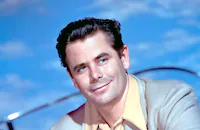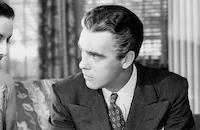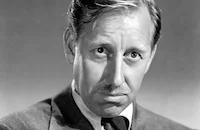The Violent Men

Brief Synopsis
Cast & Crew
Rudolph Maté
Glenn Ford
Barbara Stanwyck
Edward G. Robinson
Dianne Foster
Brian Keith
Film Details
Technical Specs

Synopsis
After three years of cattle ranching and recovering from war wounds, Civil War veteran John Parrish receives a clean bill of health allowing him to plan his return East with fiancée Caroline Vail. After witnessing the cold-blooded murder of Sheriff Martin Kenner by hired gun Wade Matlock, however, John tells the Vails that he feels compelled to remain in the valley, due to the rising tensions between the smaller ranchers and Matlock's boss, cattle baron Lew Wilkison of the Anchor Ranch. John observes that since Matlock's arrival, Anchor ranchhands have been bullying an increasing number of small ranchers into selling out to Lew. Anxious to have John give up his ranch so they can move East, Caroline is dismayed when he decides not to deal with the violence-prone Lew and later, pleads with John to think of their future. The next day, John gathers his ranchhands to announce his intention to sell out to Lew. At Anchor Ranch, John meets Lew's bitter daughter Judith, who mocks his well-known pacifism. Lew's wife Martha welcomes John and introduces him to Lew and his brother Cole. Lew, partially crippled from wounds sustained during a range war twelve years earlier, offers to buy John's ranch, but when John asks about Kenner's murder, Lew insists that he has since fired Matlock. John refuses the meager amount Cole offers to pay for his ranch, despite Lew's threat that it is useless for him and his neighbor, Hank Purdue, to hold out. Later, Martha visits Cole privately to demand that he stop seeing Elena, a young Mexican girl in town. Cole protests that as soon as Lew has succeeded in taking over the valley he will send Cole away, but Martha promises him she will not allow it, as she is in love with him, not Lew. Back at his ranch, John is fretting about Lew's warning, when a ranchhand informs him that Anchor men were seen heading towards the Purdue ranch. Angered, John takes his men towards the Purdues, but on the way finds his own hand, Bud Hinkleman, dying from torture and a gunshot by Matlock. John takes Bud's body to town to demand that new sheriff Magruder take action. Magruder explains that he is helpless as the Anchor hands will support Matlock and there are no witnesses to Bud's murder. Enraged, John's men plot retaliation, but John insists that they are outnumbered and any attack will be illegal. After his men grudgingly leave town, John takes Bud's gun to the saloon and when Matlock refuses to give himself up, kills him. The next day, John returns to Anchor to accuse Lew of lying about firing Matlock. Lew protests, but John refuses unconditionally to sell his ranch and warns Lew to leave him alone. Later, Lew berates Cole for having disobeyed his orders about Matlock, but Cole responds that Lew had gotten nowhere in his land quest until Cole took over running the ranch. Judith, overhearing the argument, is distressed when Lew, persuaded by Martha, agrees to let Cole do whatever is necessary to get him the rest of the valley. Caroline visits John and, angry and frustrated by his refusal to sell, breaks their engagement. Certain that Lew will retaliate over Matlock's killing, John takes his men into the hills above his ranch, and that night they watch Lew's men set fire to the ranch. When the men come through the hills, John's men ambush them in the pass. At the Anchor, worried that John may inspire the remaining ranchers to organize, Lew hesitates about continuing, but when Cole objects, he orders him to leave. Martha intervenes on Cole's behalf, while Judith, who is aware of her mother's involvement with her uncle, pleads with her father to send Cole away. Frustrated by Judith's recent aloofness, however, Lew agrees with Martha. Judith rides to John's to appeal to him to prevent any further violence, but determined to take action after the destruction of his ranch, John pays no heed. At Anchor, Martha finds Cole packing and implores him to stay, but when Cole asks her to give up the Anchor and go with him, Martha wavers, leaving Cole to go to Elena. John and his men stampede the Anchor's horses and cattle to draw the men away, then set fire to the ranch. As the fire spreads into the main house, Lew drops his crutches on the landing and can only watch as Martha hurls them into the flames before abandoning him. In town, Martha confronts Cole with Elena and informs him that with Lew now dead, he must remain to help her rebuild the Anchor. Judith returns to the Anchor to find Lew barely alive in the ashes and takes him to Bud's peaceful father Bill. Martha demands that Magruder deputize her men and take legal revenge upon John. Elena later beseeches Martha to leave Cole alone and refuses to accept Martha's offer of money. The deputized Anchor men begin attacking and burning outlaying farms while searching for John, who meets with the revived Lew. Judith entreats the men to put a stop to the bloodshed, and Lew insists on accompanying John to the Anchor. Lew's appearance at the Anchor startles Magruder and the men, who break up in confusion. Cole faces down John, but then is killed by him, to Martha's dismay. Upon seeing Lew, Martha flees in hysterics only to be shot down by the waiting Elena. A few days later, Judith rides out to offer John the job of running the Anchor for her father. At first he declines, but then accepts, because he has developed feelings for Judith.

Director
Rudolph Maté
Cast

Glenn Ford

Barbara Stanwyck

Edward G. Robinson

Dianne Foster

Brian Keith
May Wynn

Warner Anderson
Basil Ruysdael
Lita Milan
Richard Jaeckel

James Westerfield

Jack Kelly

Willis Bouchey
Harry Shannon
Peter Hanson
Don C. Harvey
Robo Bechi
Carl Andre
James Anderson
Katharine Warren
Tom Browne Henry
Bill Phipps
Kenneth Patterson
John Halloran
Walter Beaver
Rush Williams
Edmund Cobb
Raymond Greenleaf

Frank Ferguson
Crew
Carl Anderson
Clay Campbell
Francis Cugat
Murray Cutter
Lambert Day
Louis Diage
W. Howard Greene
Burnett Guffey
Helen Hunt
Harry Kleiner
John Livadary
Jean Louis
Sam Nelson
Lewis J. Rachmil
Max Steiner
Morris Stoloff
Jerome Thoms

Videos
Movie Clip



Hosted Intro
Film Details
Technical Specs

Articles
The Violent Men
As derived from the Donald Hamilton novel Rough Company, the narrative concerns Lee Wilkison (Robinson), a lame and embittered cattle baron with nothing in his existence to drive him except expunging the region's smaller ranchers and claiming the entire valley for his own. Spurring him on is his grasping spouse Martha (Stanwyck), a calculating harridan who manages to make time between her scheming for covert dalliances with Lee's unctuous brother Cole (Brian Keith), chief bully amongst the spread's cowhands. Whether Lee is willfully ignorant of the affair or not, it hasn't been lost upon his daughter Judith (Dianne Foster), who can't disguise her contempt from her mother.
While many of the local homesteaders have caved under the threat of the Wilkisons, retired army officer John Parrish (Glenn Ford) has taken a stand of passive resistance. Having had a lifetime's fill of violence on the battlefields of the Civil War, Parrish turns the other cheek to Wilkison's insinuations, at the cost of the faith of his fiancee Caroline (May Wynn). However, everything changes once hired thug Wade Matlock (Richard Jaeckel) guns down Parrish's unassuming ranch hand Bud (William Phipps). Drawing on his old skills as a tactician, Parrish embarks on a vengeful guerrilla assault, taking the conflict back to the Wilkisons and their hirelings, culminating in a dramatic blaze at the land baron's hacienda from which a select few of the players will walk away.
The helm on the The Violent Men was taken by Rudolph Mate, whose directing career yielded a few gems like D.O.A. (1950) and When Worlds Collide (1951). These efforts have always paled in regard to his distinguished reputation as a cinematographer, with classic efforts like Stanwyck's Stella Dallas (1937) to his credit. Visual composition, unsurprisingly, was Mate's biggest strength as a director, and The Violent Men has its share of striking imagery. The film also benefits from a particularly stirring score penned by Max Steiner.
Robinson himself had little to say about The Violent Men, except to remark that it signaled the beginning of his transition from leading actor to supporting roles, an inevitable rite of passage for aging actors. Nevertheless, he and Stanwyck brought professionalism and gravity to their unsavory roles--described by the New York Herald-Tribune as "Little Caesar in buckskin" and "Lady Macbeth of the plains"--and wound up rendering a first rate entertainment.
Producer: Lewis J. Rachmil
Director: Rudolph Mate
Screenplay: Donald Hamilton (novel), Harry Kleiner
Cinematography: W. Howard Greene, Burnett Guffey
Film Editing: Jerome Thoms
Art Direction: Carl Anderson
Music: Max Steiner
Cast: Glenn Ford (John Parrish), Barbara Stanwyck (Martha Wilkison), Edward G. Robinson (Lee Wilkison), Dianne Foster (Judith Wilkison), Brian Keith (Cole Wilkison), May Wynn (Caroline Vail).
C-96m. Letterboxed.
by Jay S. Steinberg

The Violent Men
Quotes
Trivia
Notes
Working titles of the film were Smoky Valley, Rough Company and The Bandits. Donald Hamilton's novel was serialized in Collier's (11 December 1953-22 January 1954).

Miscellaneous Notes
Released in United States on Video August 26, 1992
Released in United States Winter January 1955
CinemaScope
Released in United States Winter January 1955
Released in United States on Video August 26, 1992














